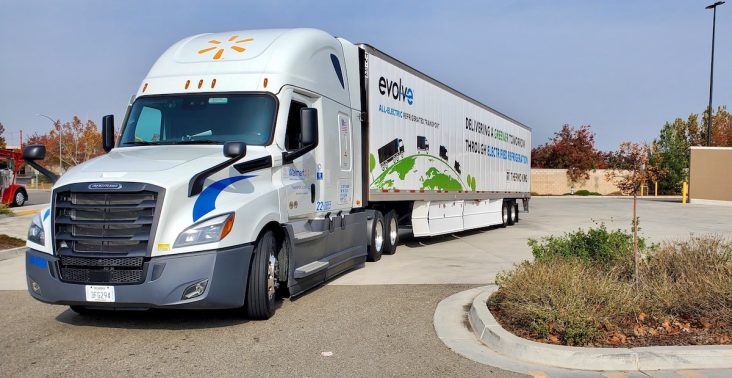Walmart invests in renewable energy, lower emissions for truck fleet
by June 8, 2022 2:36 pm 2,692 views

Walmart, working with Evolve Logistics andThermo King, will begin testing an electric powered refrigerated trailer rig in over-the-road trips this summer. It’s Walmart’s first-ever refrigerated trailer operated on battery electricity in the U.S. (photo courtesy of Walmart)
Walmart announced Wednesday (June 8) it is testing three different kinds of renewable energy to power its fleet. The retailer did not reveal costs or project timelines, but it did say it was taking advantage of tax credits with each deal.
Saving energy and reducing emissions is a key goal for Walmart which runs the largest U.S. private trucking fleet with more than 10,000 tractors and 80,000 trailers operated by 12,000 drivers. Fernando Cortez, senior vice president of transportation at Walmart, joined the retailer about eights months ago. He said Walmart is in the early stages of transitioning its trucking fleet to 100% renewable energy by 2040.
The partnerships announced Wednesday include test projects using electric, hydrogen and natural gas in the place of diesel for long haul and other Class 8 deliveries within Walmart’s supply chain. Cortez said 24% of Walmart’s total greenhouse emissions are a result of its Class 8 trucking fleet.
“We know transforming our transportation fleet is not as simple as flipping a switch, but that doesn’t mean we’re sitting idle. Today I’m excited to share more about our zero-emissions transportation strategy and announce a series of collaborations and pilots. Many of these initiatives are first-of-their kind for Walmart and will be pivotal in moving us towards a zero emissions future, while being instructive to the entire transportation industry,” Cortez said.
He said natural gas engines have a comparable range to diesel engines of around 700 miles, which makes them a potential fit for Walmart sleeper cabs, and can produce tangible emissions benefits that compound whenever powered by renewable natural gas (RNG) or RNG-linked fuel.
He said early next year Walmart will be the first transportation company to receive Cummins’ new 15-litter Natural Gas Engine and will be adding them to a few trucks. The new engine is expected to deliver the same power and torque of a 15-liter diesel engine but with significantly lower emissions, lighter weight and overall lower cost mileage than its diesel counterpart.
“To maximize the potential emissions benefits of utilizing this technology, we have secured agreements with Chevron to supply Walmart trucks with CNG linked to renewable natural gas. With so many major players in the industry working together to find a solution, we are optimistic we can drive meaningful growth in the market with critical lessons to come from this pilot,” he said.
HYDROGEN POWER
While hydrogen use is still in early development, Cortez said Walmart is among the first to adopt it. The advantage of hydrogen is, compared to battery-electric, it has a higher range of around 400 miles, takes significantly less time to refuel and weighs less, allowing trucks to haul more freight.
By this fall, he said Walmart will test a first-generation hydrogen fuel cell yard truck which is manufactured in Longview, Texas. He said yard trucks used in distribution center yards can run for 10 hours on a single recharge with little to no emissions. Cortez said promises of new hydrogen fuel cell yard truck provide hope that the fuel can eventually be used with long-haul deliveries.
Walmart has also tested electric vehicles to see where they may fit into the company’s fleet. Cortez said given weight and range capabilities of electric-battery trucks, they’re an attractive solution for yard operations, lighter weight hauls and day deliveries of around 200 miles.
Walmart has been running zero emissions electric yard trucks, similar to Autocar’s all-electric terminal tractor (E-ACTT), in its distribution centers over the last year and have found they provide approximately a 50% emissions reduction compared to diesel trucks, taking into account how the electricity is created and delivered to power the units. Walmart’s goal is to continue working to pair the trucks with renewable energy like wind, solar, or hydro power, so it can achieve a true 100% emission reduction.
TRAILER TEST
Cortez said being a grocery company, the retailer also has the opportunity to power its refrigerated trailers with electric energy. He said Walmart is working with Thermo King to haul Walmart’s first-ever refrigerated trailer operated on battery electricity in the U.S. The trailer is designed to run on 100% electricity until the batteries are fully depleted. If the electricity is depleted mid-haul, the refrigeration unit cuts to diesel.
Walmart said during the two-month trial, it ran 18 routes hauling groceries between the distribution center in Shafter, Calif., and stores in the surrounding area. The trailer ran on electricity 83% of the time in that test, according to Walmart.
Cortez said later this summer Walmart will test a battery-electric concept with Nikola and Freightliner that will use day cab trucks to pick up loads from suppliers and deliver them to a consolidation center near Fontana, Calif. He said short-range deliveries are a great use case for electric trucks.
Cortez said being a zero emissions company won’t be a simple task and it’s likely going to take several alternative fuel solutions to accomplish the goal.
“Our hope is that by testing and learning, we can find the right recipe to reduce greenhouse gas emissions and create a less impactful transportation fleet, all while still delivering the freshest food and goods to our customers,” he said. “And while many of these technologies are still in their early stage, through industry collaboration, support from policymakers and actively testing alternative fuel types in our transportation fleet, we hope to make a difference for Walmart and the rest of the transportation industry.”
